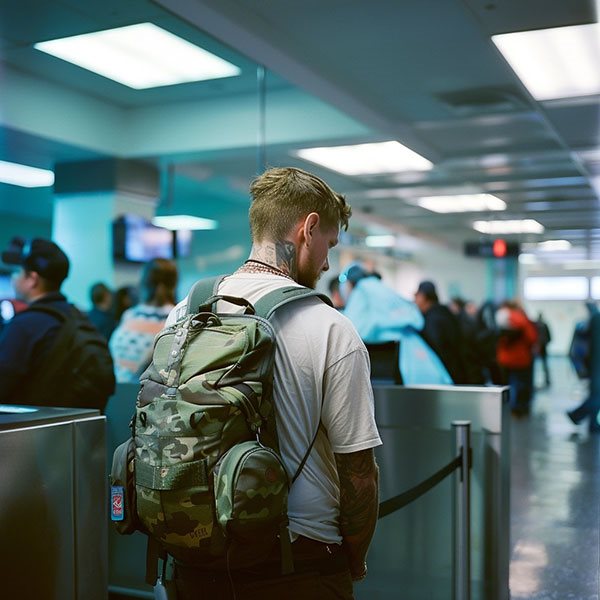Being denied entry to the United States with a criminal record from Canada can have significant consequences and implications. This comprehensive article, from a legal standpoint, aims to elucidate what happens when a Canadian citizen or resident is denied entry to the U.S. due to a criminal record, the legal framework governing such decisions, and the subsequent steps one can take.

Overview of U.S. Entry Requirements and Inadmissibility
The United States determines the admissibility of foreign nationals under the Immigration and Nationality Act (INA). Under the INA, various grounds of inadmissibility apply, including criminal records, particularly for crimes involving moral turpitude or drug offenses.
Crimes Involving Moral Turpitude (CIMT)
Crimes involving moral turpitude generally include offenses that reflect dishonesty or morally reprehensible behavior. Examples include theft, fraud, and certain violent crimes.
Drug Offenses
Nearly all drug offenses, including possession, can render a person inadmissible to the U.S.
Process of Entry and Denial at the Border
When a Canadian attempts to enter the U.S., Customs and Border Protection (CBP) officers conduct a screening process, which may include a background check revealing criminal records. If a record is found, the CBP officer assesses the nature of the offense and its relevance under U.S. immigration law.
At the Point of Entry
If deemed inadmissible, the individual is typically denied entry immediately. The CBP officer provides a reason for the denial, often in writing, and the individual must return to Canada.
Record of Denial
The denial and its cause are recorded in the U.S. immigration system. This record can impact future attempts to enter the U.S. and other immigration-related applications.
Legal Implications of Denial of Entry
Impact on Future Travel
A denial of entry can complicate future travel to the U.S. Subsequent entry attempts will likely involve more scrutiny, and the past denial must be disclosed in future visa or ESTA applications.
Ineligibility for Visa Waiver Program (VWP)
Canadians generally do not require a visa for short visits to the U.S., but a denial of entry can make them ineligible for the VWP, necessitating a visa for future travels.
Waivers and Legal Remedies
After a denial, individuals may seek legal remedies like applying for a U.S. Entry Waiver (Form I-192, Application for Advance Permission to Enter as Non-immigrant). This process involves demonstrating why they should be allowed entry despite their criminal record.
Steps After Denial of Entry
- Understand the Reason for Denial: It’s crucial to understand the specific reason for the denial to address it appropriately in future applications.
- Seek Legal Counsel: Consulting with an immigration lawyer experienced in U.S.-Canada immigration issues is advisable. They can provide guidance on the waiver process or other legal remedies.
- Gathering Documentation: For a waiver application, gather documents related to the criminal record, rehabilitation efforts, and reasons for needing to enter the U.S.
- Application for a U.S. Entry Waiver: The waiver process is detailed and requires submission of Form I-192, biometrics, and a non-refundable processing fee. The application must include a compelling case for why the applicant should be granted entry.
- Wait Time and Uncertainty: The waiver application process is lengthy, often taking several months to over a year, with no guaranteed outcome.
Rehabilitation and Overcoming Inadmissibility
Canadian Pardon/Record Suspension
Obtaining a Canadian pardon or record suspension can be a positive step but does not automatically change one's admissibility status under U.S. law.
Demonstrating Rehabilitation
Applicants must demonstrate rehabilitation, which includes showing a stable lifestyle, community ties, and absence of subsequent criminal behavior.
Legal Nuances and Considerations
Interpretation of Criminal Records
The U.S. immigration law’s interpretation of a Canadian criminal record can differ significantly from Canadian law. For example, a conviction that may be considered minor in Canada could be interpreted more severely under U.S. immigration statutes.
Impact on Long-term U.S. Immigration Plans
A denial of entry can affect long-term U.S. immigration plans, including work, study, or family-based immigration. It’s crucial to address the denial properly to mitigate its impact on future applications.
Diplomatic and Special Circumstances
In rare cases involving diplomatic or special circumstances, different procedures and considerations may apply.
Being denied entry to the U.S. with a Canadian criminal record is a complex issue that intertwines U.S. immigration law with the Canadian legal system. The immediate consequence is the inability to enter the U.S., but the long-term implications extend to future travel, immigration opportunities, and personal or professional plans involving the U.S.
Navigating the aftermath of such a denial requires a comprehensive understanding of the legal framework, meticulous preparation of waiver applications, and often
You may consider using Pardons Canada (pardons.org) to assist in the pardon, file destruction and US waiver application process. Pardons Canada (pardons.org) has been helping Canadians for over 35 years and has an expert staff of over 25 employees at their head office to gather and prepare all of the necessary documentation for the application process. You can speak to any counselor at 1877-929-6011 extension 1 and they would be happy to provide a free consultation on your specific case.





















